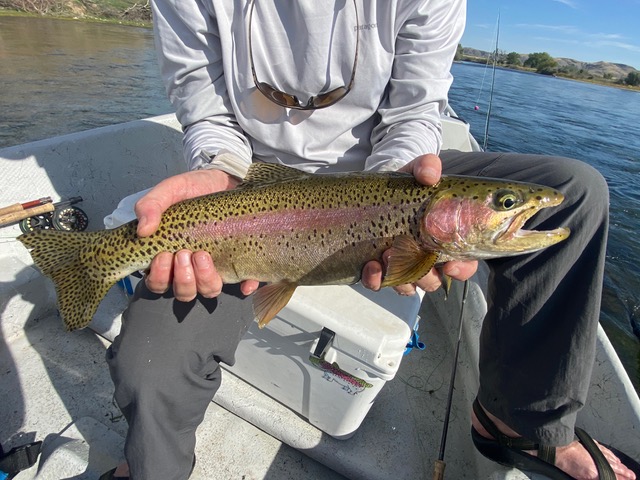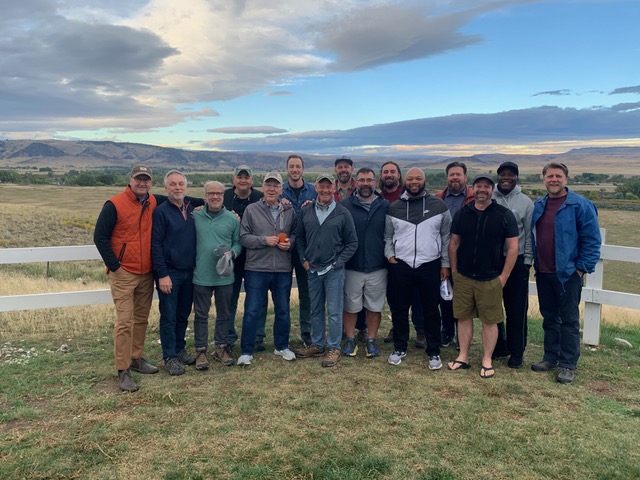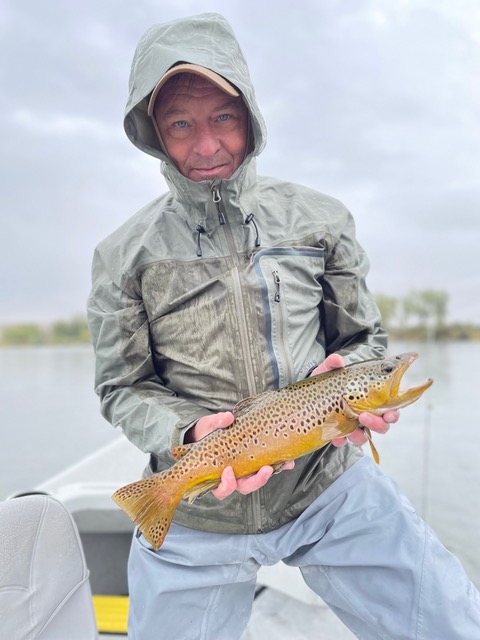 This reflection, along with my “Space for God” from this past week, marks the official launch of our 2022 “Discernment: Hearing God in a Noisy World” Series. Simply put, discerning God’s unique voice is one of the most important skills for a Christian and is absolutely crucial for our intimacy with God and our ability to follow him. And, in many ways, our world is engineered to prevent us from cultivating the skill of discernment. Because of these two realizations, we will be offering a series of resources, reflections, and programs throughout the year (like next week’s Soundings Seminar with some of our Spiritual Directors) to help all of us learn to better recognize and respond to God’s unique voice. We hope you’ll join us along the way!
This reflection, along with my “Space for God” from this past week, marks the official launch of our 2022 “Discernment: Hearing God in a Noisy World” Series. Simply put, discerning God’s unique voice is one of the most important skills for a Christian and is absolutely crucial for our intimacy with God and our ability to follow him. And, in many ways, our world is engineered to prevent us from cultivating the skill of discernment. Because of these two realizations, we will be offering a series of resources, reflections, and programs throughout the year (like next week’s Soundings Seminar with some of our Spiritual Directors) to help all of us learn to better recognize and respond to God’s unique voice. We hope you’ll join us along the way!
If you’ve spent a lot of time in the Bible or around church, there’s a good chance that you know Romans 12.2a almost by heart. “Do not be conformed to this world, but be transformed by the renewal of your mind…” Sound familiar? I bet you’re nodding your head. But, do you know what comes right after, in Romans 12.2b? For most of us, that gets a little more fuzzy, but it’s actually the main point of the verse!
In this passage St. Paul is telling us to do two things:
1) Don’t be conformed to this world, rather 2) Be transformed by the renewal of your mind.
OK, why? Why shouldn’t we be conformed to this world and why should we be transformed? What’s the point of this admonition?
The answer is found in one word: Discernment.
After giving these instructions, Paul goes on in 2b: “so that by testing you may discern what is the will of God, what is good and acceptable and perfect.”
The point of being transformed by the renewal of our mind is so that we can discern God’s will, that is, so that we can hear God’s voice in a given situation or just in our day-to-day lives. If this is the point of being transformed by the renewal of our minds (and it is) it would seem that this ability to discern matters (and it does.)
Ruth Haley Barton writes,
“Discernment, in the most general sense, is the capacity to recognize and respond to the presence and activity of God—both in the ordinary moments and in the larger decisions of our lives….Discernment literally means to separate, to discriminate, to determine, to decide or to distinguish between two things. Spiritual discernment is the ability to distinguish or discriminate between good (that which is of God and draws us closer to God) and evil (that which is not of God and draws us away from God).” (Pursuing God’s Will Together)
Discernment, the ability to hear God’s voice and know God’s will, is a crucial ability and beautiful invitation for followers of Jesus. It is how we move from simply making decisions based on a variety of factors to listening to God so that we can respond to what he is saying. It’s tragic (and unnecessary) for a Christian to be unable to distinguish God’s voice from other voices or to identify with some degree of confidence what God is saying when he’s speaking.
Discernment is also a beautiful invitation for followers of Jesus. An increased capacity for discernment is where greater intimacy with God leads, because through more experiences of hearing God’s voice we become more familiar with what God’s voice sounds like to each one of us, and we can more easily hear him.
I’ve long loved this insight from Oswald Chambers,
“Get into the habit of saying, ‘Speak, Lord,’ and life will become a romance. Every time circumstances press in on you, say, ‘Speak, Lord,’ and make time to listen… As we listen, our ears become more sensitive, and like Jesus, we will hear God all the time.”
And yet, for all of its importance and promise, discernment remains a confusing or even intimidating topic for many of us. As Christians, we believe God still speaks, but for many of us, the question remains, “Does God really speak to me, and in ways that I can know it is actually him? And with all the other loud voices that surround me, how do I distinguish God’s still, small voice (1 Kings 19.11-13)?”
I want to be able to hear God better, and I bet you do too. For my part, I want to discern like a trout.
Trout (be they rainbow, brown, brookies, or cutthroat) have an incredible ability to discern, to distinguish between that which is real and that which isn’t. They have to for their survival.

Ninety-five percent of the time, a trout feeds by pointing its nose upstream in the water, staying in one place, and watching for what the current washes past them. They are constantly observing what’s in the flow, watching for insects (like mayflies, caddisflies, stoneflies, etc) in their larvae and pupal stages as these bugs float their way to the surface of the water to hatch into adults. The fish also watch the water flow for a stray worm that got washed down from a bank, or tiny freshwater shrimp or sowbugs, or other sources of protein that live or find their way into the stream. When they see something they think is food, they go for it.
Imagine the stream like a huge buffet constantly coming at the fish, and it has to decide what is food and what is junk. To navigate this, the trout must have incredible eyesight, and it does.
The challenge for the fish is that these food sources on the liquid conveyor belt are incredibly small, and often water moves very fast, and there’s always stuff in the water that isn’t food, like bits of grass, dirt, leaves, twigs, aquatic vegetation, and often bits of micro trash. While there are many bugs in the water, there’s also a lot of debris that has no nutrient value whatsoever, and sometimes the water is unclear or muddy.

The problem for the fish is that it has to calculate how much energy will be expended to move the required distance in order to grab a morsel, and whether or not that morsel has enough calories in it to justify the effort that it takes to get it. If a trout moves too far and burns a lot of energy to get a small bite that doesn’t have enough calories in it, well, make that mistake too many times and the fish will starve. So, very quickly trout learn to be very discriminating, and they notice what food is actually in the water at a given time, what bugs are at what stage and hatching when, and that’s what they are on the watch for and key into. Trout are famously picky, which makes them so challenging to catch.
A trout’s brain is only the size of a pea, and that little computer is constantly making the calories vs. energy calculation. The fish is discerning between what is food and what is not food, and it gets very good at being able to distinguish between the two. Most of what’s in the water is not edible, which means the fish sees it and it lets it pass right on by. And when it sees food, it snatches it. It has learned to distinguish. It has learned to discern.
Sometimes something passes by the trout that has been made to closely resemble an aquatic creature it would likely be eating at a given time, hoping to fool the fish into thinking it’s real– hoping to induce a bite. In this case, that bite can end in being caught. Bits of fur and feathers and thread have been glued to a small hook to make it look like a bug in water. This is where fly fishing comes in, but more on that later.
To bring it back to spiritual discernment, the trout is a great example to follow.
Like clouds of debris floating in a stream, there is so much noise surrounding us constantly—social media, media in general, family dynamics, work demands and stress, advertisements, 24-hour news coverage, music of all sorts on demand, psychological pain, strained relationships, shouted opinions— so many voices telling us how we should think and feel and look and what we should do and, of course, buy.
Discernment is to be able to hear God’s voice amidst all those voices. Just like most of what’s in the water isn’t food for the trout and should be rejected, most of what we hear isn’t God, so the task is to identify God’s unique voice to us and respond to that. Thankfully, this is something we can learn.
Sometimes we think we’ve heard God’s voice and go after it, and it turns out it wasn’t. We’ve all been there. But there’s good news!
 Last fall I had the privilege again to go out to Refuge* in Montana with a group of brothers, some old, some new. I wrote about an earlier experience at Refuge, and what the trees said.
Last fall I had the privilege again to go out to Refuge* in Montana with a group of brothers, some old, some new. I wrote about an earlier experience at Refuge, and what the trees said.
We came from across the country and a wide spectrum of life, needing the rest, wanting whatever the Lord would have to give, and he gave more than we could have expected or imagined. We spent a lot of time on the Bighorn River, talking, laughing, breathing, and fly-fishing, hoping for an encounter with a trout. We did in fact have some encounters, and each time slipped the trout back into the water.
For most folks who fly fish, to actually catch one is just a bonus. It’s about the beauty, and the quiet, the way it slows you down and takes your mind off other things. Most fly anglers practice catch-and-release. You fool a good-sized trout to make a mistake and eat your tiny little fly tied on to a line about the width of a human hair (so the fish won’t see it), play it on a rod that is designed to bend a lot so the line won’t break, tire the fish out and get it in the net, admire its beauty and Creator, then let it back in the water, and wait for your adrenalin to come back down.
Given the name of the place we were staying, one morning I offered a little devotional on Psalm 31.1-5 which begins “In you, O Lord, do I take refuge.” The point was while Refuge is truly an amazing retreat in Montana, God is actually our refuge wherever we are.
My brother, Demetrius Summerville, pointed out something I hadn’t seen in v4: “You take me out of the net they have hidden for me, for you are my refuge”. He made the connection to fly-fishing.
“Even though trout are really good at seeing what’s real and what’s fake, sometimes they make a mistake and get caught and put in the net. But then they get released. That’s like us… sometimes we think we’re following God’s will, but we make a mistake and get caught in a net. But God always takes us out of the net.”
How comforting and reassuring and true!
Sometimes, when we’re trying to hear God’s voice amidst all the noise, we might follow another voice thinking it’s his. It happens, and God is gracious. We learn from the experience and try again. The smartest fish in the river are those that have been caught a few times. Imagine what would happen to a fish who never ate anything because it was afraid to eat the wrong thing.
The encouragement to us is since we know that God speaks and we know that we can hear him (John 10.3-4), let’s learn how to do that. Let’s learn how to discern better. The more we learn from our mistakes and the more experiences we have, the more familiar his voice becomes, and the greater the adventure with God becomes.
On the journey,

 *We were grateful to be hosted at the Refuge, a ministry to Christian leaders providing a retreat experience to help sustain their vocations. If you’d like to make this fantastic ministry possible for many like me, you can support them here. I was also grateful to Caleb who helped me have an encounter with this trout, which was happy to swim away after a photo-op! He got taken out of the net…
*We were grateful to be hosted at the Refuge, a ministry to Christian leaders providing a retreat experience to help sustain their vocations. If you’d like to make this fantastic ministry possible for many like me, you can support them here. I was also grateful to Caleb who helped me have an encounter with this trout, which was happy to swim away after a photo-op! He got taken out of the net…
